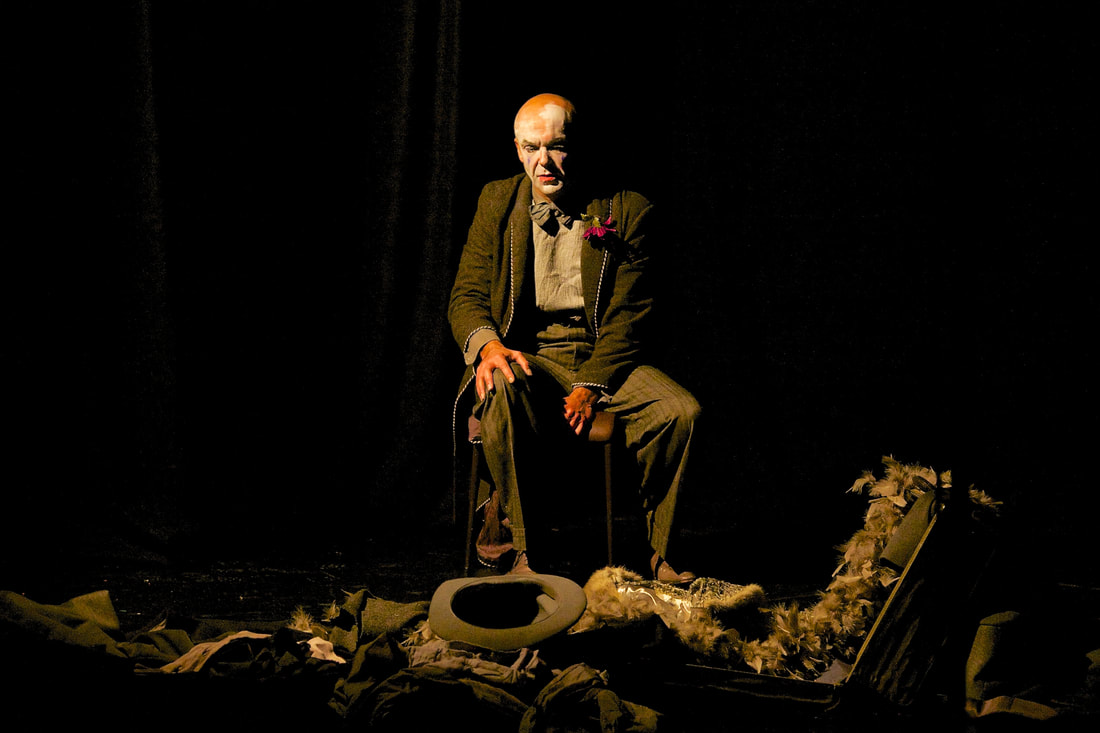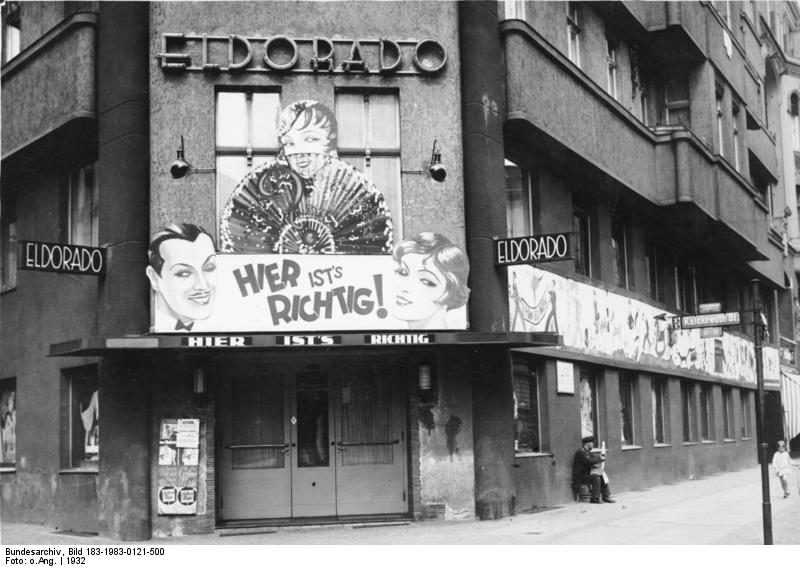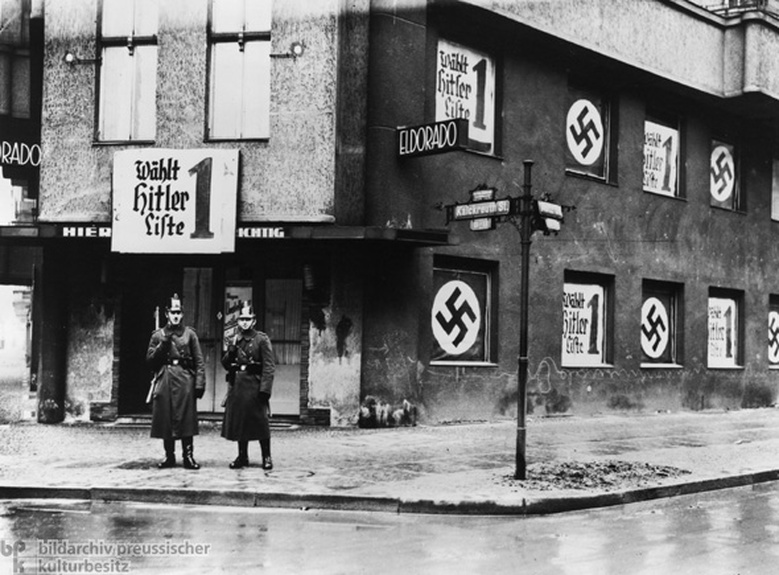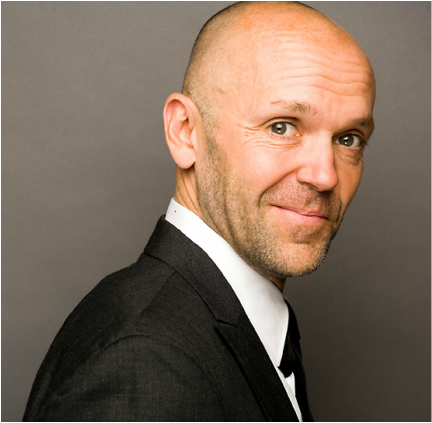watch the trailer video:
In the ruins of a theatre, after the performers are beaten and arrested by the authorities, one defiant actor attempts to perform the entire show.
Singing into The Dark, 1933 ( previously titled '33 a kabarett )takes place in an imagined version of Berlin’s Eldorado Club after the rise of Hitler. In 1933, immediately after taking power, the Nazis attacked cultural workers, hoping to destroy ideas they deemed inappropriate and silence voices that might resist them. The first concentration camps, ‘re-education camps’, were set up for cultural workers, and became brutal spaces of punishment and murders.
When Herman Goering ordered theatres to close, the Eldorado Club (a home for alternative performance, and a welcoming space for the LGBTQ+ community) was raided, and performers dragged to the camps. The club was taken over and used as the local Nazi headquarters.
Boldly bringing to life the disappeared company, the actor shows us how celebration and humor are acts of resistance, and how we can fight oppression with fury and laughter, rage and delight.
The show runs 75 minutes without intermission. Bremner sings 9 songs from the era, either with live piano or small ensemble, or a specially-recorded backtrack.
Think that this is just history? Imagine being in a modern country with a repressive government: Imagine you won a ticket to be in the audience at the taping of your favorite series. You love this show: it's crazy, rude, political, risky. It makes fun of authority and takes all the chances. Its John Oliver meets George Carlin meets RuPaul meets Dancing With The Stars. But when you arrive, something’s wrong. The doors are broken down, the studio in ruins, and the cast and crew missing. They finally crossed the line: insulted a powerful politician, spoke too much truth, and the Security Forces have taken them. Maybe they’re in prison, maybe even dead. But in front of you, staring at the empty stage, one camera remains upright, blinking green, live, broadcasting to the world. What do you choose to do?
Do you leave, run, and stay silent? Or go on camera, bear witness, speak the truth and risk your life?
Singing into The Dark, 1933 tells that story.
Singing into The Dark, 1933 ( previously titled '33 a kabarett )takes place in an imagined version of Berlin’s Eldorado Club after the rise of Hitler. In 1933, immediately after taking power, the Nazis attacked cultural workers, hoping to destroy ideas they deemed inappropriate and silence voices that might resist them. The first concentration camps, ‘re-education camps’, were set up for cultural workers, and became brutal spaces of punishment and murders.
When Herman Goering ordered theatres to close, the Eldorado Club (a home for alternative performance, and a welcoming space for the LGBTQ+ community) was raided, and performers dragged to the camps. The club was taken over and used as the local Nazi headquarters.
Boldly bringing to life the disappeared company, the actor shows us how celebration and humor are acts of resistance, and how we can fight oppression with fury and laughter, rage and delight.
The show runs 75 minutes without intermission. Bremner sings 9 songs from the era, either with live piano or small ensemble, or a specially-recorded backtrack.
Think that this is just history? Imagine being in a modern country with a repressive government: Imagine you won a ticket to be in the audience at the taping of your favorite series. You love this show: it's crazy, rude, political, risky. It makes fun of authority and takes all the chances. Its John Oliver meets George Carlin meets RuPaul meets Dancing With The Stars. But when you arrive, something’s wrong. The doors are broken down, the studio in ruins, and the cast and crew missing. They finally crossed the line: insulted a powerful politician, spoke too much truth, and the Security Forces have taken them. Maybe they’re in prison, maybe even dead. But in front of you, staring at the empty stage, one camera remains upright, blinking green, live, broadcasting to the world. What do you choose to do?
Do you leave, run, and stay silent? Or go on camera, bear witness, speak the truth and risk your life?
Singing into The Dark, 1933 tells that story.
Singing into The Dark, 1933 opens on the stage of the ravaged theatre. An actor tumbles into a space ripped apart by violence. His colleagues have been beaten and arrested by the authorities. Only their shattered props and costumes remain. He knows that to escape the same fate, the only sane choice is to be silent, and vanish into the night. But an audience has slipped through the broken doors of the theatre. Risking his life, he decides to use all his talents to defiantly recreate the acts of the missing company. In these tributes, he shows us that celebration and humor are also acts of resistance. Singing into The Dark, 1933 demonstrates how important it is to fight oppression with both fury and laughter, rage and delight.
"laughter and jaw-dropping physicality... a must see."
-Theatre Jones, Dallas
"an incredible one-man show....brilliant acting."
- PBS America
"he will have you close to tears one moment and laughing the next - an absolute joy to watch."
- New Orleans Defender Magazine
"Fletcher... is utterly arresting as the vanquished impresario of a ruined cabaret"
- Orlandotheatre.com
"Fletcher’s vocal and acting chops are both incredibly impressive, covering everything from a crass comedy routine to mournful songs of loss and desperation. The result is an entire variety show of undeniable entertainment."
- Vue Magazine, Canada
"a truly mesmerizing piece of theatre"
- Edmonton Journal
"...it’s all really quite beautiful to behold. Shows like this don’t happen very often, folks."
- The Visitorium, Canada
"A gem of a show"
- Orlando Sentinel
" And my god, does he ever sing. Bremner's performance is jaw-dropping-my jaw literally dropped"
- View Magazine, Canada
"Bremner Fletcher has.... a voice of power and inner beauty that commands the whole space..... One feels like being seduced by the sheer power and beauty of this performance"
- Musical Stages Magazine, UK
"The power of Fletcher's voice keeps the audience glued to his performance with applause after applause as each song is laid to rest. Singing in multiple languages and executing them to convey the emotion to the audience, not the actual words, shows artistic and masterful craftsmanship."
- Plank Magazine, Canada
"Bremner Fletcher, whose credits include a hit Kurt Weill cabaret, is the real thing. He’s an intense and expert singer — and more than that, performer— of the ’30s repertoire, in English, French, German, Yiddish. "
- Edmonton Sun, Canada
-Theatre Jones, Dallas
"an incredible one-man show....brilliant acting."
- PBS America
"he will have you close to tears one moment and laughing the next - an absolute joy to watch."
- New Orleans Defender Magazine
"Fletcher... is utterly arresting as the vanquished impresario of a ruined cabaret"
- Orlandotheatre.com
"Fletcher’s vocal and acting chops are both incredibly impressive, covering everything from a crass comedy routine to mournful songs of loss and desperation. The result is an entire variety show of undeniable entertainment."
- Vue Magazine, Canada
"a truly mesmerizing piece of theatre"
- Edmonton Journal
"...it’s all really quite beautiful to behold. Shows like this don’t happen very often, folks."
- The Visitorium, Canada
"A gem of a show"
- Orlando Sentinel
" And my god, does he ever sing. Bremner's performance is jaw-dropping-my jaw literally dropped"
- View Magazine, Canada
"Bremner Fletcher has.... a voice of power and inner beauty that commands the whole space..... One feels like being seduced by the sheer power and beauty of this performance"
- Musical Stages Magazine, UK
"The power of Fletcher's voice keeps the audience glued to his performance with applause after applause as each song is laid to rest. Singing in multiple languages and executing them to convey the emotion to the audience, not the actual words, shows artistic and masterful craftsmanship."
- Plank Magazine, Canada
"Bremner Fletcher, whose credits include a hit Kurt Weill cabaret, is the real thing. He’s an intense and expert singer — and more than that, performer— of the ’30s repertoire, in English, French, German, Yiddish. "
- Edmonton Sun, Canada
Upcoming Performances:
2022
September 19th, 8:30pm, The Twilight Theatre at the Allways Lounge, 2240 St Claude Ave, New Orleans
Free, with suggested donation
October 8th, 8pm, Landmark On Main St. The Jeanne Rimsky Theatre, 232 Main St #1, Port Washington, NY
October 22nd, 7pm and 10pm, The Fusion Theatre, 708 1st St NW, Albuquerque, NM
2022
September 19th, 8:30pm, The Twilight Theatre at the Allways Lounge, 2240 St Claude Ave, New Orleans
Free, with suggested donation
October 8th, 8pm, Landmark On Main St. The Jeanne Rimsky Theatre, 232 Main St #1, Port Washington, NY
October 22nd, 7pm and 10pm, The Fusion Theatre, 708 1st St NW, Albuquerque, NM
Singing Into The Dark, 1933 has been performed across North America and Europe to full houses and critical acclaim. It was invited to chosen to open the Theatre Festival in Armenia commemorating the 100th anniversary of the Armenian Genocide. It has recently toured in the Balkans and to the Ukraine, Germany, France and Eastern Europe. It has received Five Star reviews at the Edinburgh Fringe Festival and has been performed at festivals across North America .
Written and performed by Bremner Fletcher
with original direction by Dave Dawson
new direction by Joseph Furnari
costumes by Veronica Russel
dramaturgy by Caroline Russell-King and Rob Burns
original choreography by Julie Tomaino and Tracy Darin
song rights for Singing Into The Dark, 1933 secured by Della Music Publishing
Written and performed by Bremner Fletcher
with original direction by Dave Dawson
new direction by Joseph Furnari
costumes by Veronica Russel
dramaturgy by Caroline Russell-King and Rob Burns
original choreography by Julie Tomaino and Tracy Darin
song rights for Singing Into The Dark, 1933 secured by Della Music Publishing
Kabarett – a brief history
In Germany, between WWI and WWII, Kabarett was the most important creative place for musical and theatrical experimentation. Kabarett (as made popular in the musical ‘Cabaret’) was a form of musical theatre where the songs and skits often confronted and satirized the audience, instead of simply entertaining them. Satire, sex, scandal and humour flourished on stage, as song writers like Kurt Weill and Friedrich Hollaender created classic songs like ‘Mack the Knife’ and ‘Falling in Love Again’. The stars of Kabarett were the brilliant Master of Ceremonies who mocked the political and social powers of the country. In the 1930’s, as the Nazis rose to power, they brutally suppressed the Kabaretts and those who dared to perform in them. Most of the MCs who did not escape ended their days in concentration camps.
In Germany, between WWI and WWII, Kabarett was the most important creative place for musical and theatrical experimentation. Kabarett (as made popular in the musical ‘Cabaret’) was a form of musical theatre where the songs and skits often confronted and satirized the audience, instead of simply entertaining them. Satire, sex, scandal and humour flourished on stage, as song writers like Kurt Weill and Friedrich Hollaender created classic songs like ‘Mack the Knife’ and ‘Falling in Love Again’. The stars of Kabarett were the brilliant Master of Ceremonies who mocked the political and social powers of the country. In the 1930’s, as the Nazis rose to power, they brutally suppressed the Kabaretts and those who dared to perform in them. Most of the MCs who did not escape ended their days in concentration camps.
Singing Into The Dark, 1933 is loosely based on the fate of the Eldorado Club in Berlin. The Eldorado was featured in countless novels and contemporary guide books, including those by Christopher Isherwood. It featured regular performances by the likes of Marlene Dietrich, Claire Waldoff and the Weintraub Syncopators. When Herman Goering ordered the closure of the Berlin Kabaretts the Eldorado was raided and closed down. The Club was then taken over by the Nazis and used as a local headquarters.
Singing Into The Dark production pictures:
Performed and written by Bremner Fletcher, Singing into The Dark, 1933 is based directly on texts of survivors and oppressors from the 1930’s, alongside texts from more recent periods of cultural repression, including current news. The show connects history with attacks on marginalized culture and conversations happening right now, and makes us notice that we are still experiencing a ritual of repression that keeps repeating through history. Singing into The Dark, 1933 speaks to the challenge of how to honor the memory of the disappeared.
Bremner says: “I strive in my work to take risks, explore new ways of telling stories and create performances that ask the audience to engage with what’s unfolding before them. I hope to create adventurous, experimental, and innovative work that is an asset to my community and respects the legacies of communities and voices that have come before me. I’m committed to making performances that explore the contemporary world. Singing into The Dark is not only about Berlin in 1933. It is a show that, sadly, could be set in any period, even today, where people struggle to speak up in the face of violence and oppression.
Bremner says: "I don’t work with a ready-made text, so creating a new performance means collecting fragments of stories and ideas, researching a person or moment in history, and then stepping into the rehearsal room, where I will improvise, raid a costume box, try out dialogue, create a soundtrack, until something sticks. My work shifts from project to project: it may take its inspiration from movies, history, celebrities, performance art, music or visual art.
I hope to create work that is popular, accessible, politically relevant, and empowering to diverse communities. I started creating Singing into The Dark when American politics were becoming increasingly toxic and headlines were filled with anger and hatred. That was when I first heard the remarkable song by Mordecai Gebertig, 'Unsrer Shtetl Brent' (Our Town is Burning). Mr. Gebertig wrote the song in 1936 following a Pogrom in a Polish village. The song speaks of the need and the difficulty of speaking out against oppression. Before his murder in 1942, Mr. Gebertig said he wanted this song to be an inspiration to all movements against repression. I wanted to work with this powerful memento of those times.
At the same time, I was reading about 1933, when Hitler took power, and how he ordered the brutal repression of theatres and cabarets across Germany. Many writers and performers were arrested and taken to the first concentration camps; others fled the country. And finally, I found the story of the Eldorado Cabaret in Berlin. When the Nazis raided the Eldorado, they took it over and transformed it into the local Nazi headquarters. This material wove itself into Singing to The Darkness, which speaks to the events in Berlin in 1933, but also to acts of repression and censorship throughout the 20th Century and into our times. Singing into The Dark asks the simple question: When the voices around you have been silenced, how will you continue to speak up?
Bremner says: “I strive in my work to take risks, explore new ways of telling stories and create performances that ask the audience to engage with what’s unfolding before them. I hope to create adventurous, experimental, and innovative work that is an asset to my community and respects the legacies of communities and voices that have come before me. I’m committed to making performances that explore the contemporary world. Singing into The Dark is not only about Berlin in 1933. It is a show that, sadly, could be set in any period, even today, where people struggle to speak up in the face of violence and oppression.
Bremner says: "I don’t work with a ready-made text, so creating a new performance means collecting fragments of stories and ideas, researching a person or moment in history, and then stepping into the rehearsal room, where I will improvise, raid a costume box, try out dialogue, create a soundtrack, until something sticks. My work shifts from project to project: it may take its inspiration from movies, history, celebrities, performance art, music or visual art.
I hope to create work that is popular, accessible, politically relevant, and empowering to diverse communities. I started creating Singing into The Dark when American politics were becoming increasingly toxic and headlines were filled with anger and hatred. That was when I first heard the remarkable song by Mordecai Gebertig, 'Unsrer Shtetl Brent' (Our Town is Burning). Mr. Gebertig wrote the song in 1936 following a Pogrom in a Polish village. The song speaks of the need and the difficulty of speaking out against oppression. Before his murder in 1942, Mr. Gebertig said he wanted this song to be an inspiration to all movements against repression. I wanted to work with this powerful memento of those times.
At the same time, I was reading about 1933, when Hitler took power, and how he ordered the brutal repression of theatres and cabarets across Germany. Many writers and performers were arrested and taken to the first concentration camps; others fled the country. And finally, I found the story of the Eldorado Cabaret in Berlin. When the Nazis raided the Eldorado, they took it over and transformed it into the local Nazi headquarters. This material wove itself into Singing to The Darkness, which speaks to the events in Berlin in 1933, but also to acts of repression and censorship throughout the 20th Century and into our times. Singing into The Dark asks the simple question: When the voices around you have been silenced, how will you continue to speak up?
BREMNER:
Bremner was born in New York and grew up in the USA and Canada. Singing is all he ever wanted to do. Every afternoon in New York, his family could hear him coming down the street as he sang his way home from school. He started singing with Punk Rock bands, moved on to studying Opera at McGill University in Montreal, and trained in contemporary vocal music at the 'Centre for New Opera' in Banff, Alberta. He has sung operatic roles by Mozart and avant-garde masterpieces like Maxwell Davies' 'Eight Songs for a Mad King'. Bremner has performed across North America and Europe in theatre and in concert, working with chamber ensembles, orchestras and jazz quartets. He currently lives between Montreal, Paris and New Orleans, where he is is singing songs from the birth of jazz, the innovative, ground- breaking repertoire of the 1920's & 30's.
Over the past decade, Bremner has been exploring New Cabaret, creating performance pieces that are an emotional collage of ideas and songs. These pieces have been performed across North America and Europe to critical praise: "A stunning theatrical achievement"—Edmonton Journal. "Duthie brings passion, power and conviction to the songs"—The Stage. "Captivating performances of Kurt Weill's songs... beautifully delivered with power and emotion"—Edfringe Review. "Duthie is a baritone with operatic scope; instead of mere interludes, the songs become weapons”—See Magazine, Canada. “And my god, does he ever sing. Bremner's performance is jaw-dropping-my jaw literally dropped"—View Magazine.
His first recording was devoted to his own personal obsession, the extraordinary songs of Kurt Weill. Bremner recorded sparse, heartfelt versions of Weill's repertoire, which stretches from the streets of 1920's Berlin to the dazzling lights of Broadway. For his second CD, he asked the question "What is a jazz standard?". As an answer, Bremner created swinging arrangements of songs from his youth, from the Velvet Underground, Talking Heads, Joni Mitchell and others, placing them side by side with more traditional jazz standards. His last recording is a 'concept album', an exploration of musical, emotional, sexual and political inspirations behind the idea of Cabaret, with new arrangements of songs by Weill, Hollaender, Noel Coward and Sondheim.
Bremner has performed in venues that vary from 3000 seat arenas in Tokyo, to improvised atelier-lofts in Paris and Edinburgh, to table-top stages in hard-drinking bars in the small Canadian towns along Lake Superior. He says that each had its own particular delights.
FOR MORE INFORMATION ON BREMNER'S PROJECTS - WWW.BREMNERSINGS.COM
Bremner was born in New York and grew up in the USA and Canada. Singing is all he ever wanted to do. Every afternoon in New York, his family could hear him coming down the street as he sang his way home from school. He started singing with Punk Rock bands, moved on to studying Opera at McGill University in Montreal, and trained in contemporary vocal music at the 'Centre for New Opera' in Banff, Alberta. He has sung operatic roles by Mozart and avant-garde masterpieces like Maxwell Davies' 'Eight Songs for a Mad King'. Bremner has performed across North America and Europe in theatre and in concert, working with chamber ensembles, orchestras and jazz quartets. He currently lives between Montreal, Paris and New Orleans, where he is is singing songs from the birth of jazz, the innovative, ground- breaking repertoire of the 1920's & 30's.
Over the past decade, Bremner has been exploring New Cabaret, creating performance pieces that are an emotional collage of ideas and songs. These pieces have been performed across North America and Europe to critical praise: "A stunning theatrical achievement"—Edmonton Journal. "Duthie brings passion, power and conviction to the songs"—The Stage. "Captivating performances of Kurt Weill's songs... beautifully delivered with power and emotion"—Edfringe Review. "Duthie is a baritone with operatic scope; instead of mere interludes, the songs become weapons”—See Magazine, Canada. “And my god, does he ever sing. Bremner's performance is jaw-dropping-my jaw literally dropped"—View Magazine.
His first recording was devoted to his own personal obsession, the extraordinary songs of Kurt Weill. Bremner recorded sparse, heartfelt versions of Weill's repertoire, which stretches from the streets of 1920's Berlin to the dazzling lights of Broadway. For his second CD, he asked the question "What is a jazz standard?". As an answer, Bremner created swinging arrangements of songs from his youth, from the Velvet Underground, Talking Heads, Joni Mitchell and others, placing them side by side with more traditional jazz standards. His last recording is a 'concept album', an exploration of musical, emotional, sexual and political inspirations behind the idea of Cabaret, with new arrangements of songs by Weill, Hollaender, Noel Coward and Sondheim.
Bremner has performed in venues that vary from 3000 seat arenas in Tokyo, to improvised atelier-lofts in Paris and Edinburgh, to table-top stages in hard-drinking bars in the small Canadian towns along Lake Superior. He says that each had its own particular delights.
FOR MORE INFORMATION ON BREMNER'S PROJECTS - WWW.BREMNERSINGS.COM



